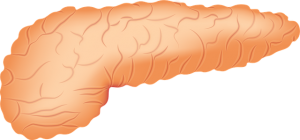Exocrine Pancreatic Insufficiency (EPI)
Your pancreas is a neat organ in that it has a dual function. It functions to regulate your blood sugar, via insulin and glucagon production, as well as aids in digestion via the production of enzymes that break down your fats, carbohydrates, and proteins. When these food particles aren’t fully broken down, it becomes challenging to absorb them into your blood stream, resulting in a malabsorption and a variety of symptoms. Exocrine Pancreatic Insufficiency is the term used to refer to the condition where there is a deficiency of pancreatic enzymes.
Causes:
- Standard American Diet (diet high in refined sugars, processed foods, fried foods)
- Overeating
- Insufficient protein
- Insufficient fiber
- Low stomach acid
- Chronic pancreatitis
- Heavy drinker/alcoholic
- Other chronic diseases, such as diabetes, Celiac Disease, Crohn’s disease, Ulcerative Colitis, Zollinger-Ellison syndrome, cystic fibrosis, Shwachman-Diamond Syndrome
Symptoms
- Bloating
- Indigestion, 1-2 hours after a meal
- Abdominal discomfort or pain
- Acid reflux
- Undigested food in stools
- Loose, watery stool
- Food allergies/intolerance
- Acne
- Abnormal weight gain or weight loss
- Hypoglycemic symptoms
Assessment:
- Blood testing: CBC, CMP, Lipase, Amylase
- A comprehensive stool analysis can further assess your pancreatic function by the markers listed below:
- Decreased Pancreatic elastase
- Decreased Chymotrypsin
- High fat in stool
- NutraEval by Genova Diagnostics provides a comprehensive nutritional assessment of amino acids, essential and metabolic fatty acids, antioxidants, vitamins, minerals, along with malabsorption markers.
Alternative Treatments
Diet:
- Avoid these foods: alcohol, refined sugars and grains, fried foods
- Anti-inflammatory diet:
- Proteins: grass fed, pasture raised, cage free, wild caught animal proteins
- Healthy fats such as coconut oil, avocado oil, organic extra virgin olive oil, flaxseed oil
- MCT oil is better tolerated for some individuals
- Vegetables: receive 2-3 servings of leafy greens per day, such as kale, swiss chard, spinach, collard greens, arugula (can add into smoothies, salads, or lightly sautéed); focus on non-starchy vegetables, raw vegetable juices
- Fruits: berries, avocados; pineapple, papaya, kiwi contain digestive enzymes that support the pancreas
- Eat smaller and more frequent meals until your symptoms improve
- Eat in a relaxed fashion, taking a few moments to give gratitude for the food you’re consuming.
- Avoid eating in between meals to allow your gut to properly digest your food and reduce any further stress on your system.
- Avoid drinking water with your meals. Drink water half an hour before or after meals.
- Chew your food slowly (30-40 chews per bite) to aid in breakdown of your food molecules.
- Drink 1 Tablespoon of apple cider vinegar in 2oz of water, 15 minutes before meals to stimulate your digestive enzymes
- Incorporate the juice of 1/2 fresh lemon in warm or room temperature water and drink daily or use fresh lemons as a dressing for salads
- Consider chamomile tea in the evenings as it lowers inflammation and promotes healthy sleep patterns.
Supplements Suggestions:
- Pancreatic Enzymes
- Pancreatic enzymes containing pancreatin can assist in breaking down food particles.
- Betaine HCL
- If one of the underlying causes of pancreatic insufficiency is low stomach acid, then a hydrochloric acid supplement may be beneficial.
- Multivitamin/multimineral
- Since most individuals with pancreatic insufficiency are not able to absorb the nutrients from their food, various nutrient deficiencies can occur. Supplementing with a broad spectrum, high quality multivitamin can be helpful in replenishing these nutrients.
If you have any questions or need specific guidance on evaluating your health concerns, schedule your complimentary 10 minute consultation with Dr. Yas by booking online or calling 480-779-8854.

